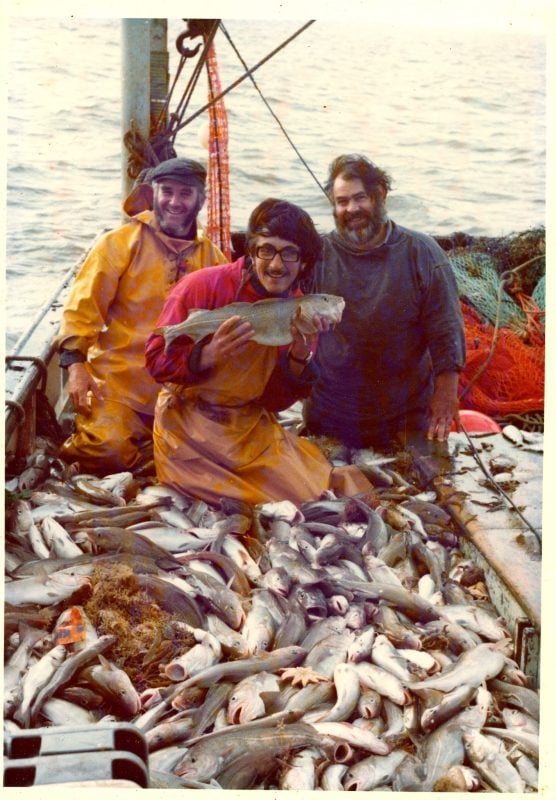Meet the Tuna Australia Board Chair Ian Cartwright
Tuna Australia appointed fisheries expert Ian Cartwright as its Board Chair in July 2023, taking over the reins from Richard Stevens. We spoke with him about his ambitions for the role, career journey and highlights, and views on the industry.
Tell us a bit about yourself.
I have had a passion for the commercial fisheries sector for my entire life. I was born in the UK, where I started my career in fishing. After coming ashore and attending university as a mature student, I worked in the Pacific Islands in fisheries development before coming to the Australian Maritime College, which had a strong connection to the fishing industry.

Ian Cartwright (centre) in the early part of his fisheries career.
From there, I served as Deputy Director at the Forum Fisheries Agency (FFA) in the Solomon Islands before returning to Australia and working as an independent with various fisheries research and management agencies. I was part of a major spawning event some years ago and am the proud father of quadruplets.
What do you hope to achieve as Chair of the Tuna Australia board?
The other members of the Tuna Australia Board will be the real achievers. I see my role as working with the Board to achieve a combined vision, ensure good governance and process, and provide a productive and effective forum for the CEO and board members to meet and deal with the seemingly never-ending challenges facing this industry.
What are the main challenges and opportunities for the tuna industry over the next five years?
Challenges:
- Inappropriate regulation, at times, formed without due regard to industry realities.
- Fuel and other costs of fishing and fish prices.
- Climate change altering patterns of distribution and abundance of target species.
- Pressure on the resource on the high seas and other EEZs, particularly from the EU regarding swordfish.
- Crew.
- An uneven playing field where Australian vessels and operators are held to world-class standards (monitoring, control, surveillance, and enforcement especially), while those often fishing the same resource have no such restrictions.
Opportunities:
- A wonderful product of which there is a limited supply vs. increasing demand.
- Greater penetration of the domestic market. I can never get over how hard it is to buy tuna in restaurants when the chilling and freezing technology is available to deliver it.
- An innovative and adaptive industry that has weathered many storms, the most recently being COVID.
You've had a long and varied career in fisheries. What have been some highlights?
I have enjoyed the contrasts in my career. These include hauling nets full of cod over the side of my trawler in the North Sea, helping small Pacific Islands with artisanal fisheries, working on the regional management of the largest tuna fishery in the world (2.5 million tonnes worth USD 4-5 billion) and dealing with individual fisheries issues on Management Advisory Committees (MACs) in Australian fisheries.
Could you tell us about your involvement in international fisheries?
While at FFA, I worked on establishing the Western and Central Pacific Fisheries Commission and have been engaged with the national and regional tuna fisheries management processes for more than 20 years. Since tuna are a shared resource, these processes are slow and cumbersome with agreement on key issues requiring consensus, which is always challenging. I have enjoyed facilitating annual processes to ensure FFA (including Australian) positions to be taken into the WCPFC are strong and consistent wherever possible.
What are your hobbies outside of work?
I have a fishing boat and am a keen recreational fisher, diver (for scallops and rock lobster) and bushwalker. I travel extensively for work and generally try to integrate some hobby activities into that travel.
What's your favourite tuna or swordfish recipe or dish?
I am mad on tuna sashimi and eat it whenever I can; bigeye and yellowfin when in the Pacific and bluefin when I or my sons catch one on the east coast of Tasmania.
Thank you, Ian.